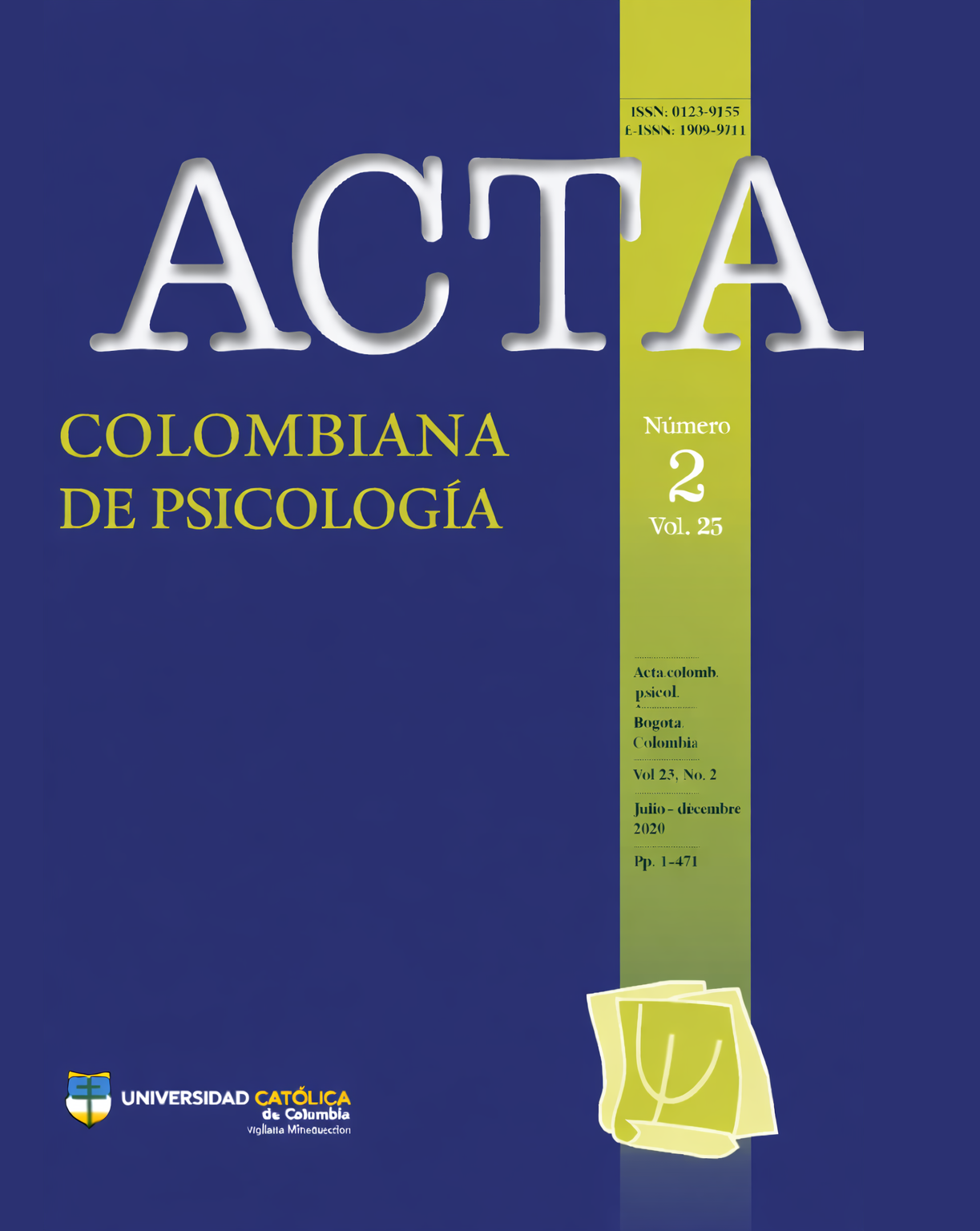Authors who publish in this journal agree to the following terms:
Acta Colombiana de Psicología complies with international intellectual property and copyright laws, and particularly with Article No. 58 of the Political Constitution of Colombia, Law No. 23 of 1982, and the Agreement No. 172 of September 30, 2010 (Universidad Católica de Colombia Intellectual Property Regulation).
Authors retain their copyright and grant to the Acta Colombiana de Psicología the right of first publication, with the work registered under Creative Commons attribution license, which allows third parties to use the published material, provided they credit the authorship of the work and the first publication in this Journal.
Abstract
Ribes and López's (1985) taxonomy proposed that psychological behavior is progressively complex and inclusive. In that respect, there is little research and data are not robust. A study was conducted with the purpose to increase data related to the complexity and inclusivity of the three less complex behaviors of the taxonomy, with three training sequences, namely: 1) ascending (contextual-supplementary-selector), 2) descending-ascending (supplementary -contextual-selector) and 3) descending (selector-supplementary-contextual). The objective was to evaluate the effect of the interaction history (related to training sequences) on differential (contextual), effective (supplementary) and precise (selector) behavior adjustment process.
Results showed that a greater number of training sessions were required to improve the performance in functional organizations with greater complexity when participants lacked an interaction history related to programmed contingencies. But, when the interaction history participated in the functional organization, as a previous interaction with the contingencies, a facilitating effect was found in the behavioral adjustment, regardless of whether the transition was ascending or descending. It is discussed whether the increase in the number of sessions is related to the complexity of each level of functional organization. Regarding the functional training transitions, ascending and descending, its effects on facilitation in learning are discussed in relation to the assumption of functional inclusivity.

References
Camacho, I. (2017). Teoría de la conducta: Una discusión sobre las categorías de medida y metodología. Acta
Comportamentalia, 25(3), 411-422. http://www.redalyc. org/articulo.oa?id=274552568008
González, V. & Ortiz, G. (2014). Efectos de la retroalimentación y el tipo de descripción de contingencias sobre la conducta de discriminación condicional en una tarea de igualación de la muestra. Revista Mexicana de Análisis de la Conducta, 40(1), 51-80. Diponible en: http://www.journals.unam.mx/index.php/rmac/article/view/63600
Kantor, J. R. (1924). Principles of psychology (Vol. 1). U.S.A.: Principia Press.
Kantor, J. R. (1926). Principles of psychology (Vol. 2). U.S.A.: Principia Press.
Kantor, J. R. (1959/1980). Psicología interconductual: Un ejemplo de construcción científica sistemática. México: Trillas.
Meraz, E. & Pérez-Almonacid, R. (2016). Efecto de diferentes tipos de interacciones verbales sobre el ajuste lector. Revista Mexicana de Análisis de la Conducta, 42(3), 222-248. Disponible en: http://www.journals.unam.mx/index.php/rmac/article/view/58839
Okouchi, H. (2007). An exploration of remote history effects in humans. Psychological Record, 57, 241-263. https://doi.org/10.1007/BF03395575
Pérez, T. & García, M. (2010). ¿Cuál es el estatus del concepto "historia de reforzamiento", de uso frecuente en el análisis de la conducta? Revista Mexicana de Análisis de la Conducta, 36(3), 77-91. Disponible en: http://www.journals.unam.mx/index.php/rmac/article/view/21398
Ramos, R. & Savage, L. (2003). The differential outcome procedure can interfere or enhance operant rule learning. Integrative physiological and behavioral science. 38(1), 17-31. Disponible en: https://doi.org/10.1007/BF02734258
Ribes-Iñesta, E. (2001). Funciontal dimensions of social behavior: theoretical considerations and some preliminary data. Mexican Journal of Behavior Analysis, 26(2), 285-306. http://rmac-mx.org/functional-dimensions-of-social-behavior-theoretical-considerations-and-some-preliminary-data/
Ribes, E. (2004). Acerca de las funciones psicológicas: un post-scriptum. Acta Comportamentalia, 12(2), 117-127. Disponible en: http://www.revistas.unam.mx/index.php/acom/article/view/14599
Ribes, E. (2007). Estados límites de campo, medios de contacto y análisis molar del comportamiento: reflexiones teóricas. Acta Comportamentalia. 15(2), 229-259. Disponible en: http://www.revistas.unam.mx/index.php/acom/article/view/14522
Ribes, E. & López, F. (1985). Teoría de la conducta: un análisis de campo y paramétrico. México: Trillas.
Ribes-Iñesta, E., Rangel, N., & López-Valadéz, F. (2008). Análisis teórico de las dimensiones funcionales del comportamiento social. Revista Mexicana de Psicología, 25(1), 45- 57. http://www.redalyc.org/articulo.oa?id=243016300003
Ribes, E., Vargas, I., Luna, D. & Martínez, C. (2009). Adquisición y transferencia de una discriminación condicional en una secuencia de cinco criterios de ajuste funcional. Acta Comportamentalia, 17(3), 299-331. Disponible en: http://www.revistas.unam.mx/index.php/acom/article/view/18156
Serrano, M. (2008). Análisis experimental de las funciones contextual, suplementaria y selectora: efectos de la concurrencia intra e intercontingencial (Tesis doctoral no publicada). Universidad de Guadalajara, México.
Serrano, M. (2009). Complejidad e inclusividad progresivas: algunas implicaciones y evidencias empíricas en el caso de las funciones contextual, suplementaria y selectora. Revista Mexicana de Análisis de la Conducta, 35(2), 161-178. Disponible en: http://www.journals.unam.mx/index.php/rmac/article/view/16202
Serrano, M. (2016). Ajuste comportamental bajo diferentes condiciones de entrega de agua Acta Comportamentalia, 24(1), 5-13. Disponible en: http://www.revistas.unam.mx/index.php/acom/article/view/54708
Schoenfeld, W. N. & Cole, B. (1972). Stimulus schedules: The t-tau system. Nueva York: Harper and Row.
Tamayo, J., & González-Becerra, V. (2018). Evaluación de la facilitación interfuncional en las funciones intrasituacionales. IPyE: Psicología y Educación, 12(24), 18-35.
Torres, C., Ortiz, G., Rangel, N. & González, V. (2012). Análilsis del concepto situación en la estructuración de las funciones psicológicas. En M. Padilla & R Pérez-Almonacid, La función sustitutiva referencial: análisis histórico-crítico/avances y perspectivas, (pp. 149-168). México: University Press of the South.
Velázquez, G. & Flores, C. (2013). Contribución de contingencias entre estímulos sobre la efectividad del comportamiento en la estructuración de campos suplementarios. Acta Comportamentalia, 21(4), 425-434. Disponible en: http://www.revistas.unam.mx/index.php/acom/article/view/43607


































